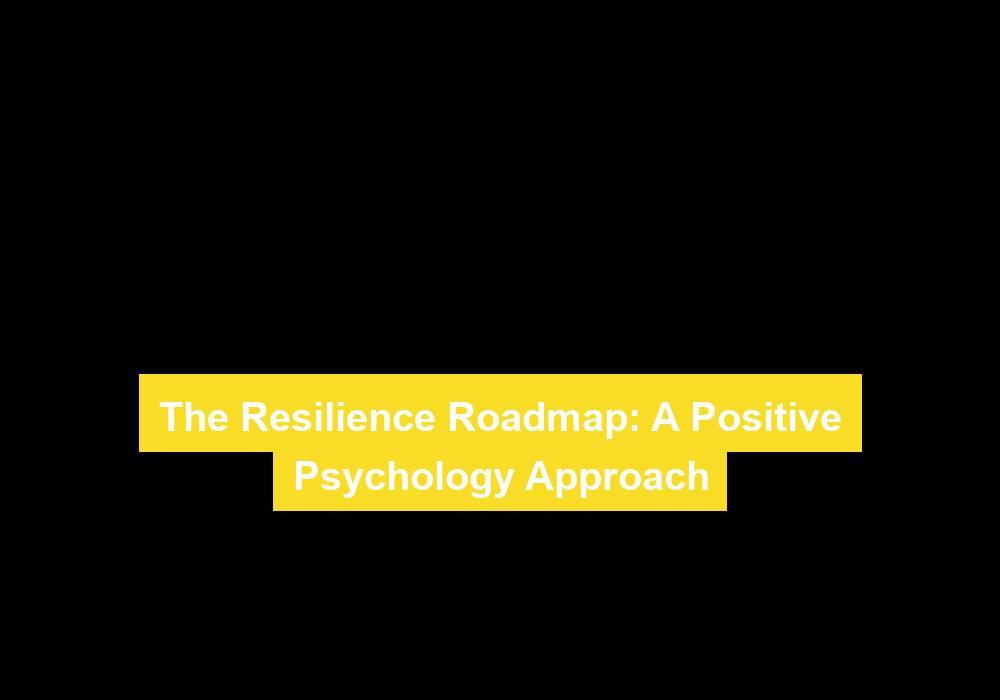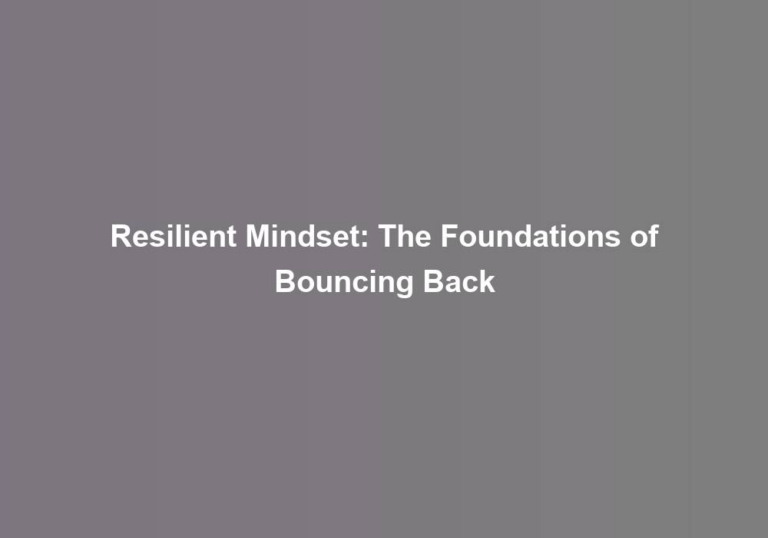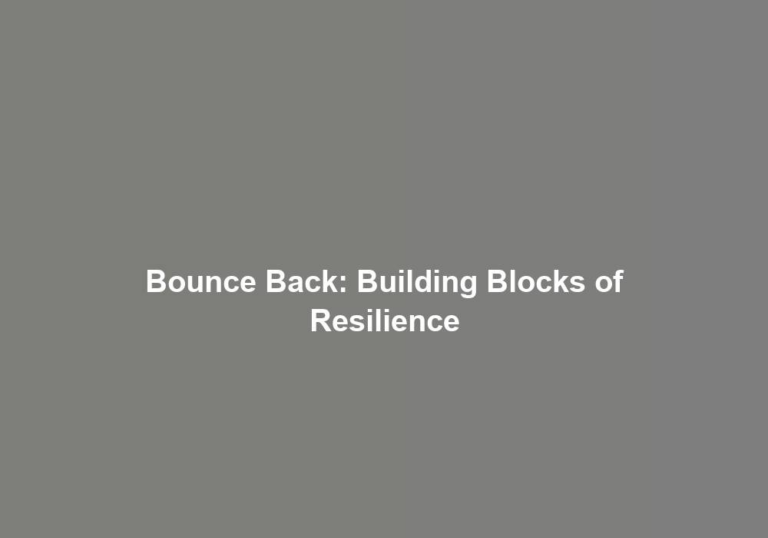The Resilience Roadmap: A Positive Psychology Approach
YouG??ve likely encountered your fair share of challenges and obstacles in life, and you understand the importance of navigating these with a sense of resilience. But what if there was a roadmap, a guide that could help you not just survive, but thrive in the face of adversity? The concept of positive psychology offers a fresh perspective on resilience, focusing on strengths, optimism, and growth. In the following discussion, weG??ll explore how the resilience roadmap, grounded in positive psychology, can equip you with the tools to not only bounce back from setbacks but to flourish in the midst of them.
Understanding Resilience
To truly understand resilience, you must recognize that it is not just about bouncing back from adversity, but also about adapting and growing stronger from the experience. Coping mechanisms play a crucial role in enhancing resilience. They are the strategies and behaviors individuals use to manage, reduce, or tolerate stress and emotional distress. These mechanisms can be both healthy and unhealthy, and they greatly influence an individualG??s ability to navigate challenges.
Mental toughness is another key aspect of resilience. It involves developing a strong mindset that enables you to cope with stress, overcome obstacles, and perform at your best, even in the face of adversity. Building mental toughness involves cultivating a positive and realistic outlook, maintaining focus and determination, and effectively managing emotions. ItG??s about developing the resilience to persevere when faced with difficulties, setbacks, and failures.
Understanding resilience also means recognizing that it is not a fixed trait but a skill that can be developed and strengthened over time. By actively engaging in self-care, seeking support from others, and cultivating a growth mindset, you can enhance your resilience and thrive in the face of challenges.
The Power of Positive Thinking
Embracing a positive mindset can significantly impact your resilience and ability to navigate challenges effectively. Your mental attitude plays a crucial role in how you approach and overcome adversity. Cultivating a positive mindset doesnG??t mean ignoring difficulties or putting on a fake smile; instead, itG??s about adopting a constructive perspective that empowers you to find solutions and maintain hope in the face of difficulties.
When you maintain a positive mindset, you are more likely to see setbacks as temporary and manageable. This mental attitude allows you to approach challenges with a sense of determination and optimism, rather than feeling defeated or overwhelmed. It also enables you to reframe negative situations, focusing on the lessons learned and potential growth opportunities that may arise.
Furthermore, a positive mindset can enhance your overall well-being, contributing to lower stress levels and improved mental health. By fostering a habit of positive thinking, you create a supportive environment for yourself, which can help you build resilience and cope with challenges more effectively. ItG??s important to remember that developing a positive mindset is a continuous practice. It involves being mindful of your thoughts and intentionally choosing to reframe negative situations in a more constructive light.
In essence, your mental attitude has the power to shape your resilience and capacity to overcome obstacles. By nurturing a positive mindset, you can bolster your ability to navigate lifeG??s challenges with strength and optimism.
Building Strengths and Skills
When you actively build on your strengths and skills, you equip yourself with valuable tools to reinforce your positive mindset and effectively confront lifeG??s challenges. Resilience development is a continuous process that involves honing your existing skills and acquiring new ones. Here are some ways to build and enhance your strengths and skills:
-
Identify Your Strengths: Take the time to reflect on your accomplishments and the activities that come naturally to you. Recognizing your strengths provides a solid foundation for further skill enhancement.
-
Embrace Your Uniqueness: Embracing what makes you unique can lead to a deeper understanding of your strengths. This self-awareness can guide you in developing specific skills that complement your natural abilities.
-
Seek Feedback and Support: Engage with trusted individuals who can provide constructive feedback and support as you work on building your strengths and enhancing your skills. This external perspective can offer valuable insights and encouragement.
Embracing Change and Growth
As you navigate the journey of resilience development, embracing change and fostering personal growth becomes essential for adapting to lifeG??s challenges. Embracing uncertainty is a vital skill in the face of change. It involves acknowledging that life is unpredictable and that not everything can be controlled or planned for. By accepting this uncertainty, you can cultivate a mindset that is open to new possibilities and experiences. Embracing uncertainty allows you to let go of the need for absolute predictability and instead focus on building the resilience needed to navigate whatever comes your way.
Fostering adaptability is another crucial aspect of embracing change and growth. It involves developing the skills and mindset to adjust and thrive in different situations. By fostering adaptability, you can become more flexible and open to change, which is essential for resilience. This can involve cultivating a willingness to learn, unlearn, and relearn as you encounter new circumstances. It also means being open to seeking out new opportunities for personal and professional growth, even if they may initially seem daunting.
Embracing change and growth is not always easy, but it is a necessary part of building resilience. By embracing uncertainty and fostering adaptability, you can develop the strength and flexibility needed to navigate lifeG??s inevitable challenges and setbacks. This approach allows you to not only survive but thrive in the face of change.
Navigating Challenges With Optimism
Navigating challenges with optimism involves cultivating a positive mindset and resilience to thrive in the face of uncertainty and change. When you encounter adversity, itG??s essential to approach it with a hopeful outlook and a belief in your ability to overcome obstacles. Here are some key strategies for navigating challenges with optimism:
-
Practicing Gratitude: Cultivating hopefulness can begin by acknowledging the things you are grateful for, even in difficult times. Take a moment each day to reflect on the positive aspects of your life, no matter how small they may seem. This practice can help shift your focus from obstacles to opportunities, fostering a more optimistic mindset.
-
Reflect on the support and love you receive from those around you. This can be a powerful source of strength during challenging times.
-
Seek out moments of joy and beauty in your daily life. Finding and appreciating these small pleasures can help build a sense of optimism and resilience.
-
Finding Meaning and Purpose: When facing adversity, connecting with your sense of purpose can provide a guiding light. Reflect on what truly matters to you and how you can align your actions with your values. This can help you stay motivated and optimistic, even in the midst of challenges.
-
Cultivating Self-Compassion: Embracing optimism involves being kind to yourself, especially when things are tough. Practice self-compassion by treating yourself with the same kindness and understanding that you would offer to a friend facing similar challenges. This can help you build resilience and maintain a positive outlook.
Conclusion
So, as you journey through life, remember that the resilience roadmap is your guide to navigating the twists and turns with optimism and strength. Just like a skilled navigator uses the stars to guide their way, you can use the power of positive thinking and building your strengths to overcome any challenge that comes your way. Embrace change and growth, and keep moving forward with confidence. The road may be bumpy, but you have the tools to thrive.







